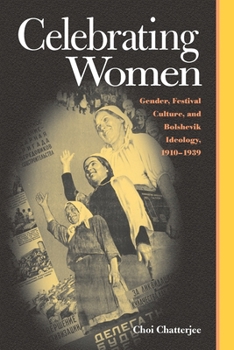Celebrating Women: Gender Festival Culture & Bolshevik Ideology 1910-1939
Select Format
Select Condition 
Book Overview
The first International Women's Day was celebrated in Copenhagen in 1910 and adopted by the Bolsheviks in 1913 as a means to popularize their political program among factory women in Russia. By 1918, Women's Day had joined May Day and the anniversary of the October Revolution as the most important national holidays on the calendar. Choi Chatterjee analyzes both Bolshevik attitudes towards women and invented state rituals surrounding Women's Day in Russia and the early Soviet Union to demonstrate the ways in which these celebrations were a strategic form of cultural practice that marked the distinctiveness of Soviet civilization, legitimized the Soviet mission for women, and articulated the Soviet construction of gender. Unlike previous scholars who have criticized the Bolsheviks\u2019 for repudiating their initial commitment to Marxist feminism, Chatterjee has discovered considerable continuity in the way that they imagined the ideal woman and her role in a communist society. Through the years, Women's Day celebrations temporarily empowered women as they sang revolutionary songs, acted as strong protagonists in plays, and marched in processions carrying slogans about gender equality. In speeches, state policies, reports, historical sketches, plays, cartoons, and short stories, the passive Russian woman was transformed into an iconic Soviet Woman, one who could survive, improvise, and prevail over the most challenging of circumstances.
Format:Paperback
Language:English
ISBN:0822961105
ISBN13:9780822961109
Release Date:April 2002
Publisher:University of Pittsburgh Press
Length:240 Pages
Weight:0.70 lbs.
Dimensions:0.6" x 6.0" x 8.9"
Customer Reviews
0 rating





